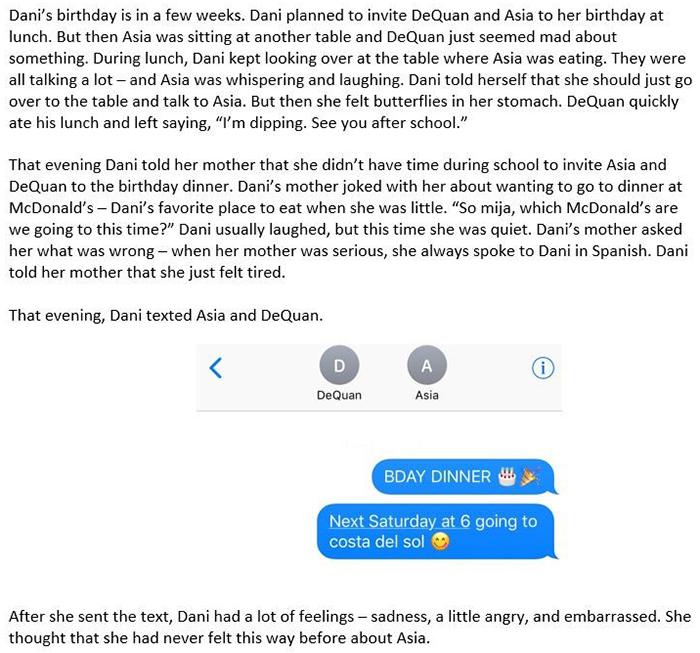Building Healthy Relationships Among DC Youth: A Universal Bullying Prevention Program
Child Trends developed El Camino: The Road to Healthy Relationships as a curriculum to prevent bullying and other forms of interpersonal conflict, both in-person and online. The program was designed for and piloted with students in District of Columbia (DC) middle schools—grades 6 through 8—to help them develop knowledge, attitudes, skills, and behaviors that support their ability to make decisions that foster healthy relationships with their peers, parents, family, and partners. The curriculum focuses on decision-making and personal values, and includes lessons and activities on coping with strong emotions, teen brain development, empathy, assertive communication, and boundary setting. El Camino: The Road to Healthy Relationships is intended for in-person implementation in youth-serving agencies, including schools and out-of-school time (OST) programs.
The El Camino: The Road to Healthy Relationships curriculum materials are available for download in English. Materials include:
Fact sheet (PDF): This brief describes the El Camino: The Road to Healthy Relationships curriculum, along with its scope and sequence, flexible format, and activities included; it also describes the pilot testing of the program in five middle school classrooms.
Front matter (PDF): This package provides background information on the curriculum’s core components, unique features, goals, scope and sequence, key teaching methods, and lesson structure. The front matter also contains a self-assessment of key teacher competencies, facilitation suggestions, background resources, and a fidelity monitoring tool.
Lesson plans (PDF): This package contains lesson plans for each of the curriculum’s 10 lessons and an appendix of student handouts and printed materials.
Facilitator PowerPoint slide deck (PowerPoint): This slide deck is designed for use by facilitators alongside lesson plans and may be modified to suit the needs of their students.
Training manual (PDF): This manual equips staff in educational institutions and OST programs to deliver a training workshop for curriculum facilitators who will implement El Camino: The Road to Healthy Relationships.
Training workshop PowerPoint slide deck (PowerPoint): This slide deck is designed for training workshop facilitators to use alongside the training manual and may be modified to suit the needs of their institution.
What is El Camino: The Road to Healthy Relationships?
El Camino: The Road to Healthy Relationships aims to help middle school-aged youth build the skills to create healthy relationships, both in-person and online. Our Scope and Sequence consists of two units for the sixth through eighth grade band, with lessons aligned to DC curricular health standards. The curriculum contains ten 60-minute lessons, which may also be split in half and delivered across twenty 30-minute sessions. The lessons build upon one another by reinforcing previously introduced topics. Each unit contains five lessons. The curriculum may be used within any grade level within the band but is not designed to be used at every grade level (i.e., delivered in consecutive years). Activities within the lessons contain notes for teachers to identify when and how they might adapt the discussion based on the grade they are teaching within the grade band.
In Unit 1: Values, Identity, and Decision-Making, students will identify their personal values and consider how these values shape their personal identity and influence how they interact with others. Students will also learn a decision-making framework called STAR (Stop. Think. Act on your values. Reflect.) to help them identify and cope with strong emotions and navigate interpersonal conflict or relationship challenges. In this unit, students are introduced to a group of young people in the context of a novella/story. These characters and their experiences—including interactions over text, social media, and video game chats—are used throughout the curriculum to provide a means for students to talk about issues and challenges that they may face, and to practice communication skills through role plays.

In Unit 2: Practicing Healthy Relationships Skills, students will learn about and practice using healthy relationship skills (e.g., empathy, assertive communication, and boundary setting) to act on their values while navigating interpersonal conflict or relationship challenges. Students will consider how their personal values influence their choice of words and actions as they practice using each of these skills in response to real-life scenarios. They will also consider how their choice of words and actions can promote positive digital citizenship and develop and maintain healthy peer, parent, family, and partner relationships.

Development and piloting
In September 2017, the DC Office of Human Rights and DC Health partnered with Child Trends to adapt an existing evidence-informed curriculum, El Camino, for use with Washington, DC middle school youth to improve healthy relationship skills and prevent bullying and other forms of interpersonal conflict. The original El Camino curriculum is a comprehensive, goal-setting teen pregnancy prevention program developed by Child Trends, that aims to reduce teen childbearing and increase educational achievement among adolescents—particularly Latino youth. To adapt this curriculum to support middle school youth in developing healthy relationships, Child Trends engaged in a rigorous development and testing process. From 2017 to 2020, Child Trends developed El Camino: The Road to Healthy Relationships through a series of focus groups conducted with DC educators, parents, and near-peers (high school students who could reflect on their own middle school experiences) and piloted the curriculum in five DC classrooms with a diverse group of students ages 11 to 14. The final curriculum is a result of continuous quality improvement across this time, and incorporates feedback from DC teachers and administrative leadership, student focus groups and surveys, classroom observations, and facilitator debriefs.
Watch a webinar on El Camino: The Road to Healthy Relationships
This webinar will provide more information on the background, core components, and unique features of the El Camino: The Road to Healthy Relationships curriculum; it will also offer a brief overview of each individual lesson within the curriculum.
© Copyright 2024 ChildTrendsPrivacy Statement
Newsletter SignupLinkedInThreadsYouTube